
February 8, 2016 | by Michael Wilt
Categories: Construction, First Time Buyer, Home Buyer Education, Home Rehabilitation/Repairs, Homeownership
Advances in technology have helped reduce the amount of energy homes use per square foot. However, many Americans aren't seeing much savings on their utility bills. This is because while the energy consumption per square foot goes down, the overall square footage of American homes has gone up.
Using data from the Department of Energy's Office of Energy Efficiency and Renewable Energy, a CityLab article estimates that energy consumption in homes has dropped 31 percent per square foot between 1970 and 2012. This is largely due to improvements in insulation, weatherization, appliances and heating and cooling systems all of which contribute to less energy use.
But during roughly that same time period, homes got bigger. According to Census Bureau numbers included in the above article, homes averaged 1,660 square feet in 1973. By 2014, the average home size had ballooned to 2,660 square feet. So even if energy is used as efficiently as possible, larger homes require more energy.
Avoid a "Second" House Payment
Homeowners, especially first time ones, will face many unanticipated homeownership-related costs whether its maintenance, repairs, general upkeep, and oftentimes high utility bills. These costs can add up quickly, so much so that affordable housing professionals sometimes call them "second" house payments because they can be as high as mortgage payments in some months.
This is one of the reasons TSAHC requires individuals who use one of our homeowership programs to go through a home buyer education course before purchasing a house. We want home owners to make an educated decision about the type and size of house they can truly afford. We want to make sure that getting into the home of your dreams doesn't turn into an unsustainable financial burden.
Further Resources for Energy Efficiency
In addition to considering the size of your house, we encourage you to explore the links below for helpful tips on saving energy and money at home.
U.S. Department of Energy - Energy Saver Guide
Duke Energy's 100 Ways to Save Energy at Home
Featured Content on Energy Efficienct Homes from doityourself.com
On the House blog posts are meant to provide general information on various housing-related issues, research and programs. We are not liable for any errors or inaccuracies in the information provided by blog sources. Furthermore, this blog is not legal advice and should not be used as a substitute for legal advice from a licensed professional attorney.
TSAHC reviews all blog comments before they are posted to ensure a positive experience for our online community. Off-topic comments; hostile, derogatory or deliberately insulting comments; and comments specifically promoting goods and services will not be posted.
Approved comments will be published in their entirety. Personal information will not be removed unless it pertains to someone other than the person submitting the comment. For more information, please see our Comment Posting Guidelines.
To remove a previously submitted and published comment, please contact Anna Orendain at [email protected].
If you have a question regarding any of TSAHC's programs, please contact us.

Thanks for the great share! I also like the idea of Home Efficiency. The best part I like is this: The reliability and availability of modern energy sources cause people to tend to assume that it will always be accessible. And as for the case of non-renewable energy sources, most people do not know or maybe even refuse to accept that it will eventually run out.